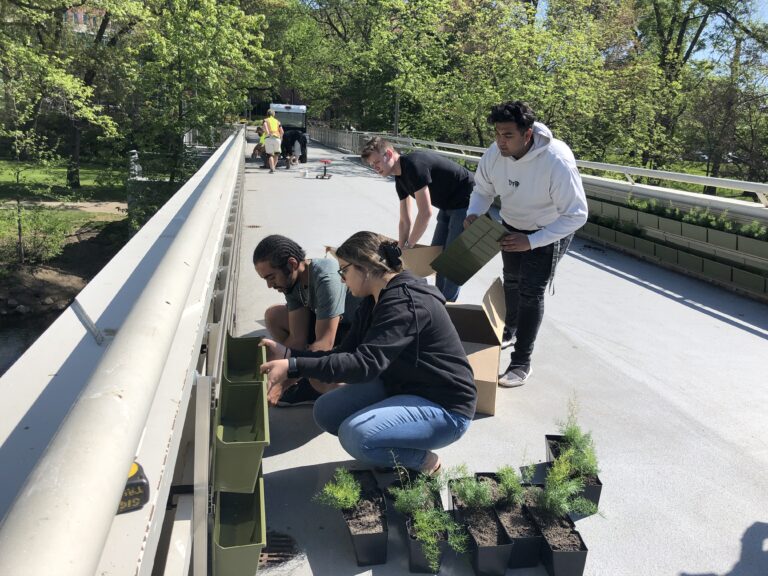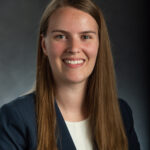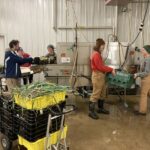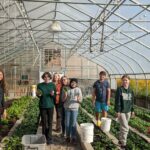
- Kim Kisner
- Community
- 11/21/2022
With a Focus on Campus, Community, Curriculum, and Culture, MSU Aims to Meet a Mission of Advancing Knowledge and Transforming Lives

With the tagline ‘A Better Tomorrow is Up to Us,’ Michigan State University is working to minimize its footprint while driving new generations of leaders and influencers in sustainability.
As a pioneer land-grant university and Michigan’s first agricultural college, MSU works to be a change agent for communities to accelerate cross-sector climate response; serve as an important knowledge generator and convener; educate the next generation of leaders that are most likely to be disproportionately impacted by the effects of climate change; and influence the lives of students, alumni, and stakeholders for many generations.
Sustainability Program Coordinator Laura Young shares with SBN Detroit how the work that’s being done in East Lansing is designed to impact the campus, Southeast Michigan communities, and businesses now and forward.

Q: When did sustainability practices at MSU begin?
A: MSU’s history is rooted in sustainability as an agricultural school, and It’s been going strong for decades. But one thing I can point to as an example is our work and efforts around reuse recycling. In 1988, students petitioned the board of trustees to bring recycling on campus and two years later it was established.
(Recycling) has grown tremendously and in 2010 we opened a LEED Gold Certified Surplus Store and Recycling Center. Today, the operation has greatly expanded. We’ve added a robotic sorter to our material recovery facility to enhance safety and efficiency. We’re able to divert more organic materials from the landfill thanks to expanded food waste programs and a vermicomposting facility at the center. Through all of these efforts, we’ve decreased the amount of trash per student by 66% since 1990.
Our progress as a sustainable institution is a continual evolution. When we commit to something there is never an endpoint, we are always driving to do better and improve.
Q: Your website states the following: Having the foundational understanding of nature’s complex relationships as a premier land grant institution, MSU is well-positioned to influence the lives of students, alumni, and stakeholders for many generations. Can you tell us more about that?
A: When we think about our role as educators and knowledge generators, we are well-positioned to act as agents of change.
We are educating our leaders of tomorrow. And we’d be doing a disservice if we didn’t teach them about climate change and sustainability. They need to deeply understand the impact these global challenges have and will have on the world and leave campus ready to do great work around this.
We know businesses are going to need graduates who are ready to hit the ground running toward their sustainability goals, and we are prepping them.
Q: What are your short-term sustainability goals?
A: We are going through a transitional period in the Office of Sustainability. We lost a great leader, Amy Butler, who passed away earlier this year. We are in the process of hiring a new director of sustainability and will continue to build upon many great sustainability accomplishments.
Like many businesses, MSU has experienced many hardships because of the pandemic. This is our first year with fully in-person operations. We are doing a lot of rebuilding and piloting new initiatives. MSU is strengthening our Student Organic Farm and bringing back our Green Office program and Eco Rep Program among many others.
Q: What is the Eco Rep Program?
A: This is a program that is run by Student Life and Engagement. (SLE) Students are responsible for helping to educate other students to become strong environmental stewards. These kids are passionate and have tremendous energy and we know that students are better messengers to communicate with other students. So, this is a peer program – a role model program – ensuring that we launch environmental stewards out into communities and businesses and the world when they graduate.
Q: MSU’s sustainability focuses are campus, curriculum, community, and culture. How does that framework help MSU meet its sustainability goals?

A: This is our 4-C Framework and it speaks to the holistic and comprehensive perspective that we apply to sustainability.
First, “campus” encompasses our sustainable operations such as our nationally recognized solar carports that deliver 10.5 megawatts of peak power. But we also have incredibly impactful initiatives that aren’t as well known.
One example is SLE’s Pack Up. Pitch In, a program that supports diverting waste during move-in and move-out on campus, which is in its 25th year. 17,000 students moving in each year can generate a lot of waste. This year we celebrated 25 years of the program and collected over 12,000 pounds of food at move out that we donated to local charities. During fall move-in we diverted over 60% of materials from landfills, including 1,200 pounds of polystyrene and 68,000 pounds of cardboard.
Curriculum deals with how we are educating our students about sustainability and the innovative research happening at MSU around global challenges. We have over 800 courses and 20 undergraduate degrees that address sustainability. We have immersive living-learning programs like RISE that let students explore sustainability issues in applied contexts.
Campus and Curriculum intersect – our campus is a living lab that gives students real-world experience in solving sustainability problems. They work alongside staff and faculty and use our infrastructure as a testbed for sustainable solutions.

An example of this is our Green Walls. The club Sustainable Spartans wanted to create an indoor green wall in 2020, but then the pandemic hit, and they had to pivot. The project gave students problem-solving experience, experience working with multiple campus partners and vendors, experience managing a project, experience with budgets and fundraising, and more. Ultimately the project culminated in a beautiful legacy that they have left behind for students, employees, alumni and visitors to enjoy.
In terms of Community, as an institution, we play a large role in engaging and working with community partners to advance sustainability. For example, MSU has played a large role in extending the regional trail system in Mid-Michigan including expansions of the Lansing River Trail and much more.
And the fourth C – Culture – deals with social aspects of sustainability including health and well-being, diversity and inclusion, and making the university more affordable and accessible.
But most importantly is how we create a culture of sustainability where our students and employees approach problems and decision-making with a sustainability lens. Our Strategic Plan strongly supports climate goals and sustainability and I am seeing people do things differently to help us reach our goals.
Q: What are your biggest challenges as a college/university when it comes to sustainability?
A: We talk about the university as a city. We have our own power plant, recycling center, 65,000 students and employees, and visitors on campus daily. And it takes a lot of work to get all the pieces moving together, to address aging infrastructure and plan for a resilient campus, and to effectively communicate across our large institution about ways to get involved and be spartan green.
Q: What has been the most rewarding thing you’ve experienced at MSU in terms of working on sustainability?
A: The institution as a whole has gotten a lot of accolades and that’s a testament to our late director, Amy Butler. her predecessors and our dedicated students and employees. I’m very proud of those recognitions.
But by far the most rewarding thing is working with our amazing students and seeing their passion, their creativity, and their deep concern. Seeing this, I know our future is in good hands.
Q: What do the next five years look like?
A: Our strategic plan sets two climate change goals. One is to reduce carbon emissions from a 2010 baseline by 50% by 2030. A longer-term goal is to achieve climate neutrality by 2050.
We continue to focus not only on operational changes but our 4-C Framework. This ties in with our goal to become a platinum-rated STARS university (Sustainability Tracking Assessment & Rating System) by 2030 through the Association for the Advancement of Sustainability in Higher Education. We earned our second STARS gold-rating earlier this year.
Between our curriculum, our extension into the local community, our work with businesses, and our research we continue to work toward things that can be applied.
Q: How do you perceive the students’ engagement with and passion around sustainability now and going forward.?
A: Student engagement keeps getting stronger. Students are at the heart of sustainability at MSU. They are always advocating for change and creating change. Many are looking toward careers in sustainability.
Our job is to help expose them to opportunities. Businesses, communities, the state, country, and the world are going to need this talent and we are working to ensure that it will.
Be sure to subscribe to our newsletter for regular updates on sustainable business practices in and around Detroit.
Kim Kisner
- All
- Business
- Community
- Education
- Events

Unique Monique Scented Candles, a Detroit-based business founded by Monique Bounds., aims to produce candles and household products with clean ingredients and local supply chains. What began as a personal hobby during college has evolved into a full-time venture producing coconut oil and soy-based candles made with essential oils and locally sourced materials. SBN Detroit interviewed Bounds about launching a sustainable product line, sourcing challenges in Michigan, and...

Eastern Market Partnership, in collaboration with the City of Detroit’s Office of Sustainability Urban Agriculture Division, has announced $240,000 in grant funding to support Detroit-based farmers and farmer collectives. The grants will advance food access, climate education, sustainable land use, and economic opportunity, with priority given to Black- and Indigenous-led farms, youth-led initiatives, and projects rooted in historically disinvested neighborhoods. The recipients – ranging from cooperatives and community...

Citizen Robotics is a Detroit-based nonprofit that advances the use of robotics and digital manufacturing in residential construction, focusing on improving productivity, sustainability, and long-term affordability. Best known for its early work in 3D-printed housing, it explores how alternative construction methods and new financial models can reduce material waste, lower lifetime operating costs, and enhance the resilience of homes. SBN Detroit interviewed Tom Woodman, founder and president of...







